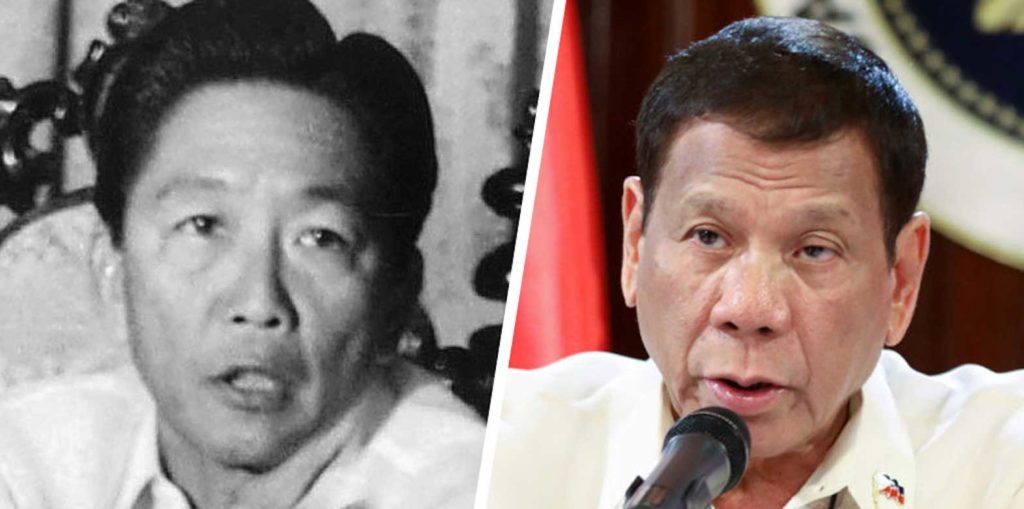Philippine history repeats itself

Marcos and Duterte. INQUIRER FILE
The murder of England’s Catholic Primate, Thomas Becket, in 1170 upon the royal order of his former friend, King Henry II, is a historical déjà vu or a repetition of an event which has happened some 90 years before. In 1079, the Catholic Primate of Poland, Stanisław Szczepanowski, was murdered by King Bolesław the Bold, his former friend.
Mark Twain once wrote that his favorite theory was that “no occurrence is sole and solitary, but is merely a repetition of a thing which has happened before, and perhaps often.” In other words, history repeats itself, in what Australian historiographer Garry Winston Trompf calls “historical recurrences.”
Asia-Pacific history repeated itself when English explorer James Cook in Hawaii in 1779 decided, with only a few men, to fight the native Polynesians, the Kānaka Maoli, who killed him and his men. In 1521, Portuguese explorer Ferdinand Magellan (Fernão de Magalhães), with a few dozen armed men, decided to fight a thousand warriors of Lapulapu, a native leader of Mactan. Magalhães and most of his men were killed in the so-called the Battle of Mactan.
When the first couple Gloria Macapagal-Arroyo and Jose Miguel Arroyo were accused of committing plunder in the $329-million National Broadband Network (NBN) deal with Chinese ZTE Corp, it was deja vu. We recall that the First Couple Ferdinand and Imelda Marcos were also accused of plunder. So was Joseph Estrada, Arroyo’s predecessor.
The historic recurrences in this case are not of the striking-similarity kind, for Estrada was convicted of plunder by the Sandiganbayan in 2007, while Arroyo’s plunder charge was dismissed by the Supreme Court in 2016, and Imelda was convicted of graft (not plunder) and ordered arrested by the Sandiganbayan in 2018. They are all out of jail nonetheless.
Picture Padres Mariano Gomez, José Burgos, Jacinto Zamora (Gomburza), and Toribio, Marcelo H. Del Pilar’s older brother, in their happy days. Then all of a sudden, the Cavite Mutiny in 1872 occurred. After Governor General Rafael Izquierdo (1820-1883) suppressed the Cavite Mutiny in 1872, he masterfully manipulated the situation to implicate the liberals, reformists, the Gomburza, and other Filipino “revolutionary clergy.” Carpe diem! He seized the moment and grabbed the golden opportunity to silence those who were critical of the colonial authorities.
What followed the Cavite Mutiny was eerie, a period best described by historian O.D. Corpuz as the “Reign of Terror of 1872.” A golpe-de-gulat wave of arrests, imprisonments, executions, or banishments cowed an entire generation into silence with a cruel brutality never experienced before. Educated Filipinos and reformists became prime suspects, and henceforth arrested and jailed indefinitely.
Manila characterized Izquierdo as the “Iron Fist,” a leader who was ready to dance with the devil. For him, the public sacrifice of blood was necessary to quiet the brewing dissidence and, in order to sow fear and trembling among the citizens, the Governor General made sure that suspected promotores de problemas were summarily executed or deported.
In his own “Reign of Terror” of 1970s, Ferdinand Marcos red-tagged a hundred Catholic clergy, including Bishops Francisco Claver, SJ, of Malaybalay, Ka “Tony” Fortich of Bacolod, Julio Labayen of Infanta, and four other prelates, and ordered their arrest after accusing them of subversion. In the new millennium, Duterte has accused four bishops, three priests, and some lay leaders of sedition and red-tagged others. His motive was the same: To silence and them and make them fold up like a meadow of Mimosa pudica or makahiya.
When High school student Nica Glorioso wrote an essay for the Martial Law Museum entitled “The Iron Fist and the Reign of Silence,” she meant it for the Marcos dictatorship (1972-1986). But Glorioso’s reflections could easily be applied to Izquierdo’s (1871-1873) and Duterte’s regimes (2016-2022) by virtue of what we know as historical déjà vu.
We are therefore reminded of G. W. Trompf’s message in his book The Idea of Historical Recurrence in Western Thought, id est, we must learn well the lessons of history, for the historical “past teaches lessons for future action,” and that we must be wiser to choose leaders than those who lived before us, for we deserve what we choose.
Jose Mario Bautista Maximiano (facebook.com/josemario.maximiano) is the author of THE SIGNS OF THE TIMES and the Social Doctrine of the Church: An Epistemology(Salesiana, 1991) and MCMLXXII: 500-Taong Kristiyano. Volume Two (Claretian, 2021)

